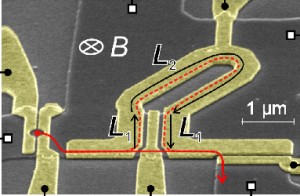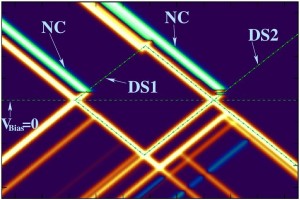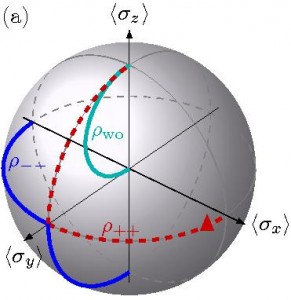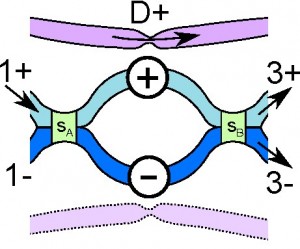A brief overview of my main research areas in quantum theory.
Quantum transport
Quantum transport studies the motion of electrons in structures small enough that quantum effects play a dominant role. Typical objects of study are quantum dots and wires, nanotubes and molecules. The behaviour and interactions of electrons in these novel structures is of fundamental interest, and points the way for future developments in electronics and computation.
Currently I am working understanding the physics of the “hot” electrons produced by single-electron sources like these at NPL.

A goal of this research is to perform quantum optics-like experiments with these hot electrons. Highlights of the research so far include:
- Theory and experiment on the relaxation of hot electrons due to phonon emission [theory paper] [exp paper].
- Overview of decoherence mechanisms of hot electrons and a plan for mitigating against them [paper].
- A study of phase averaging in a hot-electron Mach-Zehnder interferometer [paper].
Other research themes in quantum transport include
- Full counting statistics, and in particular frequency-dependent statistics
- Dark states and coherent population trapping
- Leggett-Garg inequalities
- Entanglement
- Liouvillian perturbation theory and quantum master equations
- NonMarkovian effects in transport

Quantum computation
Quantum computers promise to use the peculiar properties of the quantum world to unlock extreme speed-ups for certain computational tasks. My recent research in this field involves exploring the capabilities of IBM’s Quantum Experience platform in collaboration with Paolo Zuliani‘s group in Computing.
Quantum feedback control
In the everyday world, feedback is often used to bring a systems behaviour under control. The central heating thermostat is a classic example.
I am interested in transferring the ideas of feedback control into the quantum realm and in particular, into the solid state. A particular focus is on single-electron transport in nanostructures such as quantum dots, and you can read a review of this work here.
Themes include
- quantum state stabilsation
- Maxwell’s daemon
- Delayed Feedback
- Waiting-time control
This research takes place in collaboration with Tobias Brandes and other members of SFB 910: Control of self-organizing nonlinear systems.

Leggett-Garg inequalities
Leggett-Garg inequalities provide a fundamental test of whether an object is behaving in accordance with the classical rules of our everyday experience or whether it is guided by something else (e.g. quantum mechanics). Originally developed to shed light on the issue of macroscopic coherence (Schroedinger’s cat!), these inequalities are currently the subject of much interest both experimentally and theoretically.
More can be read in my review article with Neil Lambert and Franco Nori here or here.

Other interests
Other interests include:
- Light-matter interactions and the Dicke model
- Quantum information processing in quantum dots
- Entanglement characterisation
- The coupled-cluster method (CCM)